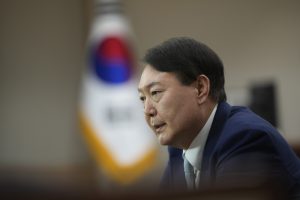South Korean President Yoon Suk-yeol’s participation in ceremonies marking the 75th anniversary of NATO this week is particularly timely, given that last month’s summit between North Korean leader Kim Jong Un and Russian President Vladimir Putin reinforced the direct linkage between the ongoing war in Ukraine and tensions on the Korean Peninsula. North Korea’s supply of munitions to Russia has helped lengthen the conflict in Ukraine, while a newly inked North Korea-Russia mutual defense agreement raises the likelihood of Russia providing advanced technology for North Korea’s nuclear and missile development as a quid pro quo for North Korea’s expanding munitions supply.
The restoration of the North Korea-Russia strategic relationship following decades of dormancy will both embolden Kim to engage in bolder provocations toward South Korea and link inter-Korean relations directly to the Ukrainian battlefield. South Korea’s national security advisor has suggested that South Korea’s direct provision of military assistance to Ukraine will be conditioned on Russia’s expanding technological assistance to North Korea. This statement includes implicit calls on Putin to exercise restraint in supplying advanced technologies to North Korea, but it does not respond sufficiently to the direct implications of a revitalized North Korea-Russia relationship for South Korea’s security.
The growing North Korea-Russia relationship represents a dramatic expansion of the scope of security risks that South Korea is likely to face from North Korea’s unchecked drive to enhance its military capabilities. Not only has the revived North Korea-Russia relationship further paralyzed the capacity of the U.N. Security Council to implement a dozen resolutions condemning North Korea’s nuclear and ballistic missile development, but it will also likely accelerate North Korea’s ability to field a space satellite system and its efforts to develop a submarine-launched ballistic missile system, both of which would erode advantages that the U.S.-South Korea alliance currently enjoy.
North Korea’s acquisition of advanced Russian technologies would dramatically expand the scope and capacity of North Korea as both a peninsular and international security threat. Indeed, the envisioned expansion of the North Korea-Russia mutual defense commitment along the lines foreshadowed in the treaty represents a dramatic escalation of security risks to South Korea that also serves to directly link peninsular instability to the ongoing war in Ukraine.
As a result, the Yoon administration must make the early curtailment of the North Korea-Russia strategic relationship a major South Korean strategic priority. These circumstances give added importance to Yoon’s participation in NATO meetings this week in Washington DC because South Korea has an even more direct stake than before in the duration and outcome of the war in Ukraine.
The immediate challenge Yoon faces is that Putin has already threatened actions that overstep the level of assistance to North Korea that South Korea has indicated would trigger the provision of direct military assistance to Ukraine. Yoon may want to pledge direct support to Ukraine for surface-to-air missile systems that enhance Ukraine’s defense from Russian bombardments. This step may be particularly important as a signal to Putin that South Korea will not sit idly by as he revitalizes relations with Pyongyang. South Korea should also give priority to any form of military assistance beyond defensive systems that might help bring an early end to the military conflict.
South Korea should also use the NATO summit to actively pursue diplomatic discussions on achieving a ceasefire in Ukraine, especially since a Korean armistice-style agreement has been mentioned by some analysts as a likely outcome of the military conflict. The purpose of such diplomacy for South Korea would be to generate greater political urgency around the goal of ending the military dimension of the war. Although South Korea is unlikely to play a decisive mediating or brokering role in achieving such an outcome, South Korea’s interest in reducing the scope and duration of North Korea’s munitions supplies to Russia provides Seoul with a strong motivation for pursuing more active diplomacy designed to support an end to the conflict.
Yoon should use the NATO summit to underscore South Korea’s resolve to respond by showing that it will not be intimidated by the emergence of Russia as a protector of North Korea while also curtailing the supply of North Korean munitions to Ukraine. This goal can be achieved through diplomacy aimed at suppressing Russia’s demand for such weapons by supporting an early end to military hostilities. Yoon’s efforts should mark the start of a stepped-up South Korean role to bring the conflict in Ukraine to an early and favorable conclusion, both at the NATO summit and through enhanced U.S.-Japan-South Korea diplomatic coordination.
































